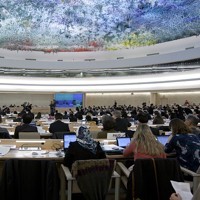In 2006, the United Nations created the Human Rights Council to replace the discredited Commission on Human Rights. Among the numerous mechanisms the U.N. gave the council to promote and protect human rights is the ability to call ad-hoc special sessions when needed. These special sessions, when used against states, are an important tool for “naming and shaming” perpetrators of human rights violations and may, on occasion, precipitate movement at the Security Council.
Through the first five years of its existence, the council held 18 special sessions, or almost four per year. That pace slowed down in 2012, however, during which the council has held only one special session. More important than the reduced number of ad hoc sessions called, however, is the fact that over the past few weeks, the 2012 council has missed out on two critical opportunities to assert itself as the premier global institution for protecting human rights.
In particular, the council failed to respond to the violence that wreaked havoc on southern Israel and Gaza during Operation Pillar of Defense. It also took a pass on the heightened fighting in eastern Democratic Republic of Congo (DRC), where the M23 insurgency recently took over Goma, an important provincial capital. The latter conflict has been ongoing since midsummer, but it has intensified over the past month, with reports of significant human rights violations, including rapes, on both sides. While the M23 rebels have now withdrawn from Goma after negotiations with international mediators, the situation remains precarious, and fighting may erupt again at any moment.

